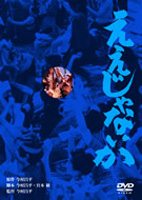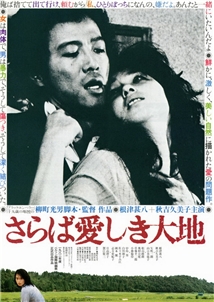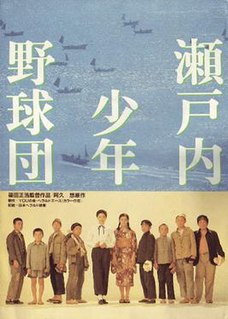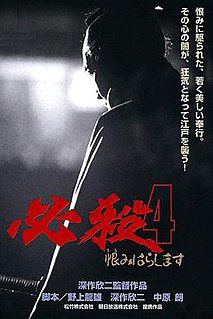 W
WThe Burmese Harp is a 1985 Japanese film directed by Kon Ichikawa. The film is a color remake of the 1956 black-and-white The Burmese Harp, which was also directed by Ichikawa.
 W
WCapone Cries a Lot is a 1985 Japanese comedy directed by Seijun Suzuki and starring Kenichi Hagiwara. The film is based on the novel of the same name by Toshiyuki Kajiyama.
 W
WA Chaos of Flowers , also known as The Rage of Love, is a 1988 Japanese film directed by Kinji Fukasaku. The film portrays the movements of society and art in the Taishō period from the viewpoint of Akiko Yosano.
 W
WCrazy Thunder Road is a 1980 Japanese punk-action-biker film written and directed by Sōgo Ishii. Ishii made the film as his graduation project whilst studying at Nihon University and was subsequently distributed by Toei Studios.
 W
WDotonbori River , also released as Lovers Lost, is a 1982 Japanese film directed by Kinji Fukasaku. The title refers to the area of Dōtonbori.
 W
WHokusai Manga, better known internationally with its exploitative title Edo Porn, is a 1981 biographical drama based on the life of Japanese artist Hokusai directed by Kaneto Shindo. It draws visual and narrative inspiration from the artist's eponymous collection of sketches and focuses on an anachronistic story related to creation of The Dream of the Fisherman's Wife.
 W
WEijanaika or Why Not? is a 1981 Japanese film by director Shohei Imamura. It was screened in the Un Certain Regard section at the 1981 Cannes Film Festival.
 W
WFall Guy is a 1982 Japanese film directed by Kinji Fukasaku, with art direction by Akira Takahashi. It was chosen as the Best Film at the Japan Academy Prize ceremony.
 W
WFarewell to the Land is a 1982 Japanese drama film directed by Mitsuo Yanagimachi. It was entered into the 32nd Berlin International Film Festival.
 W
WFemale Prisoner: Cage , also known with the Mondo Macabro DVD title Female Prisoner: Caged!, is a 1983 Japanese women in prison film in Nikkatsu's Roman porno series, directed by Masaru Konuma and starring Mina Asami.
 W
WFinal Take is a 1986 Japanese drama film directed by Yoji Yamada. It was Japan's submission to the 59th Academy Awards for the Academy Award for Best Foreign Language Film, but was not accepted as a nominee.
 W
WFire Festival is a 1985 Japanese drama film directed by Mitsuo Yanagimachi. It was screened in the Un Certain Regard section at the 1985 Cannes Film Festival.
 W
WThe Funeral is a 1984 Japanese comedy film by director Juzo Itami.
 W
WThe Gate of Youth is a 1981 Japanese film directed by Kinji Fukasaku and Koreyoshi Kurahara sequel of the film Seishun no mon Jiritsuhen was released in 1982.
 W
WThe Geisha (陽暉楼) is a 1983 Japanese film directed by Hideo Gosha.
 W
WGonza the Spearman is a 1986 Japanese drama film directed by Masahiro Shinoda. It was entered into the 36th Berlin International Film Festival, where it won the Silver Bear for outstanding artistic contribution.
 W
WGray Sunset is a 1985 Japanese film directed by Shunya Ito. It was Japan's submission to the 58th Academy Awards for the Academy Award for Best Foreign Language Film, but was not accepted as a nominee. It won the award for Best Film at the Japan Academy Prize ceremony.
 W
WHope and Pain is a 1988 Japanese film directed by Yoji Yamada. It was Japan's submission to the 61st Academy Awards for the Academy Award for Best Foreign Language Film, but was not accepted as a nominee. It was also entered into the 39th Berlin International Film Festival.
 W
WHouse on Fire is a 1986 Japanese film directed by Kinji Fukasaku. It was chosen as Best Film at the Japan Academy Prize ceremony. The film grossed ¥1.010 billion in Japan.
 W
WI Are You, You Am Me , also known as Exchange Students, is a 1982 Japanese fantasy film directed by Nobuhiko Obayashi. Obayashi himself directed and co-wrote a second film based on the same novel, premiered in 2007 and titled Switching: Goodbye Me .
 W
WInternational Military Tribunal for the Far East is a 1983 Japanese documentary film on the International Military Tribunal for the Far East, directed by Masaki Kobayashi.
 W
WItoshino Half Moon is a 1987 Japanese film directed by Yōjirō Takita. Based on a novel by actress Mieko Harada, screenwriter Hiroshi Saito won the "Best Screenplay" award at the Yokohama Film Festival for this film.
 W
WKagerō-za is a 1981 independent Japanese film directed by Seijun Suzuki and based on a novel by Kyōka Izumi. It forms the middle section of Suzuki's Taishō Roman Trilogy, preceded by Zigeunerweisen (1980) and followed by Yumeji (1991), surrealistic psychological dramas and ghost stories linked by style, themes and the Taishō period (1912–1926) setting. All were produced by Genjirō Arato.
 W
WToshi in Takarazuka – Love Forever is a 1983 Japanese dance and musical film directed by Umetsugu Inoue, presenting Toshihiko Tahara, a singer then noted for his abilities as a dancer, with a large supporting cast of singers and dancers – mainly drawn from the roster of the Johnny & Associates talent agency of Johnny Kitagawa. The film was shot in the Tokyo Takarazuka Theatre Tokyo and Yurakucho on January 29–30.
 W
WLove Hotel (ラブホテル) is a 1985 Japanese pink film in Nikkatsu's Roman porno series, directed by Shinji Sōmai and starring Noriko Hayami.
 W
WThe Love Suicides at Sonezaki is a 1981 near life-size Bunraku puppet film based on Chikamatsu's sewamono The Love Suicides at Sonezaki. Director Midori Kurisaki convinced Living National Treasure puppeteers Tamao Yoshida and Minosuke Yoshida to let her take their puppets outdoors for live action filming outside the traditional Bunraku theatre - the first time anyone had filmed such a performance in outdoor scenery.
 W
WMacArthur's Children is a 1984 Japanese film. Describing the impact of the United States' occupation of Japan from the perspective of the inhabitants of a small, rural island community, the film featured the big screen debut of actor Ken Watanabe.
 W
WMangetsu no Kuchizuke is a 1989 Japanese horror film directed by Ryū Kaneda and starring Eri Fukatsu. It was released in Japan on April 8, 1989.
 W
WMirai Ninja: Keigumo Kinin Gaiden , known as Cyber Ninja in the United States, Warlord in Canada and Robo Ninja in the UK, is a 1988 Japanese science fiction action film directed by Keita Amemiya, which was co-produced and released by Namco that premiered on October 1988 at the Tokyo International Fantastic Film Festival. Two months later, it was released as a direct-to-video film on December 2, 1988. The film is based on the arcade game of the same name which was also developed and released by Namco.
 W
WMuddy River is a 1981 Japanese drama film directed by Kōhei Oguri. It was nominated for the Academy Award for Best Foreign Language Film. It was also entered into the 12th Moscow International Film Festival where it won the Silver Prize.
Nagai Go no Kowai Zone: Kaiki is a Japanese direct-to-video horror film released in 1989 by the Bandai Media Division. It was the first film co-directed by Go Nagai along with Hikari Hayakawa. It features special appearances of other manga artists such as Chiaki Kawamata. The film has a sequel called Nagai Go no Kowai Zone 2: Senki.
 W
WNinja Wars is a 1982 Japanese jidaigeki film directed by Kōsei Saitō. It is based on Futaro Yamada's novel of the same title.
 W
WOnimasa is a 1982 Japanese film directed by Hideo Gosha. Based on the novel of Tomiko Miyao.It was Japan's submission to the 55th Academy Awards for the Academy Award for Best Foreign Language Film, but was not accepted as a nominee.
 W
WS&M Hunter is a 1986 comedy pink film directed by Shuji Kataoka and starring Shiro Shimomoto, Hiromi Saotome and Yutaka Ikejima.
 W
WShanghai Rhapsody is a 1984 Japanese musical drama film directed by Kinji Fukasaku, adopted from the 1979 musical with the same name.
 W
WA Sign Days (Aサインデイズ) is a 1989 Japanese film directed by Yōichi Sai.
 W
WThe Silk Road , also known as Dun-Huang, is a 1988 Japanese film directed by Junya Satō. The movie was adapted from the 1959 novel Tun-Huang by Yasushi Inoue. The backdrop of the plotline is the Mogao Caves, a Buddhist manuscript trove in Dunhuang, Western China, located along the Silk Road during the Song dynasty in the 11th century.
 W
WStation is a 1981 Japanese film directed by Yasuo Furuhata. Among many awards, it was chosen as Best Film at the Japan Academy Prize ceremony.
 W
WStation to Heaven (天国の駅) is a 1984 Japanese film directed by Masanobu Deme.
 W
WSukeban Deka the Movie 2: Counter-Attack from the Kazama Sisters is a live action Japanese film that was released in 1988. The is a sequel to the TV series Sukeban Deka III: Shōjo Ninpō-chō Denki, based on the manga series Sukeban Deka which was written and illustrated by Shinji Wada. It stars the TV series's lead Yui Asaka.
 W
WSure Death 4: Revenge is a 1987 jidaigeki film directed by Kinji Fukasaku as part of the Hissatsu series of films.
 W
WA Taxing Woman's Return is a 1988 Japanese comedy film written and directed by Juzo Itami. It is the sequel to Itami's 1987 comedy A Taxing Woman. Nobuko Miyamoto plays female government tax investigator Ryoko Itakura. She investigates a religious sect, led by Teppei Onizawa, that is suspected of being used for tax evasion. The sect is part of a complex conspiracy involving the yakuza, political corruption, and a prestigious construction project.
 W
WTheater of Life is a 1983 film directed by Kinji Fukasaku, Sadao Nakajima and Junya Satō.
 W
WTime Adventure: Zeccho 5-byo Mae is a 1986 Japanese pink film directed by Yōjirō Takita.
 W
WTora-san Plays Daddy aka Torasan's Tale is a 1987 Japanese comedy film directed by Yoji Yamada. It stars Kiyoshi Atsumi as Torajirō Kuruma (Tora-san), and Kumiko Akiyoshi as his love interest or "Madonna". Tora-san Plays Daddy is the 39th entry in the popular, long-running Otoko wa Tsurai yo series.
 W
WTyphoon Club is a 1985 Japanese film directed by Shinji Sōmai.
 W
WW's Tragedy is a 1984 Japanese film directed by Shinichirō Sawai, based on the novel by Shizuko Natsuki. At the 9th Japan Academy Prize it won three awards and received three other nominations.
 W
WYuwakusha (誘惑者) is a 1989 Japanese film directed by Shuichi Nagasaki.
 W
WZegen is a 1987 Japanese black comedy film by director Shohei Imamura. It was entered into the 1987 Cannes Film Festival. The film was selected as the Japanese entry for the Best Foreign Language Film at the 60th Academy Awards, but was not accepted as a nominee.